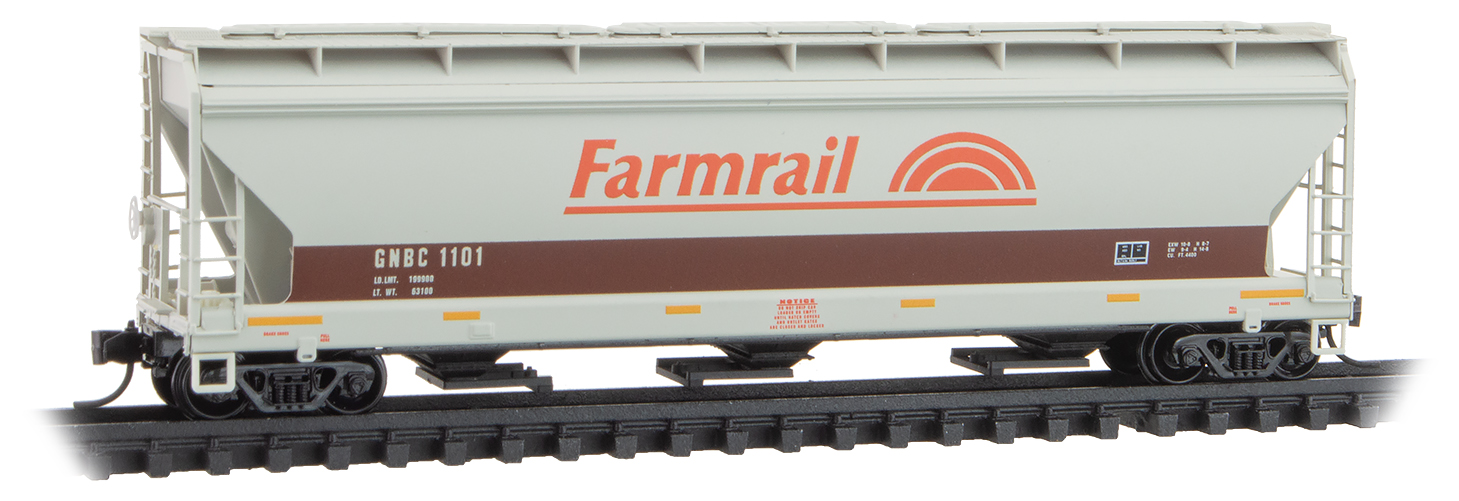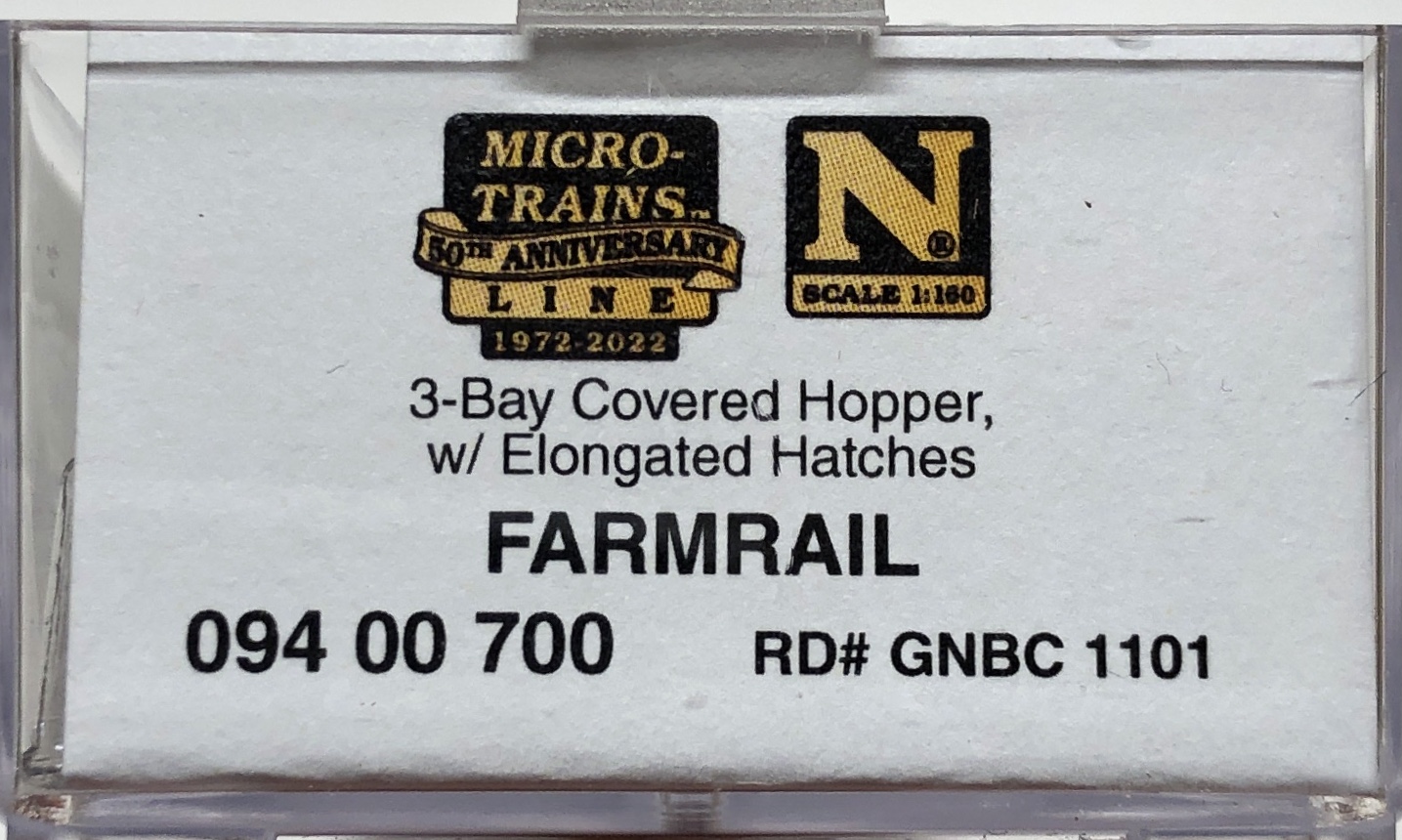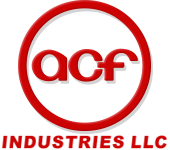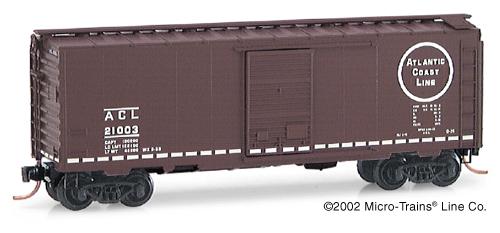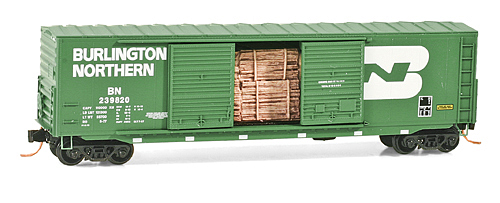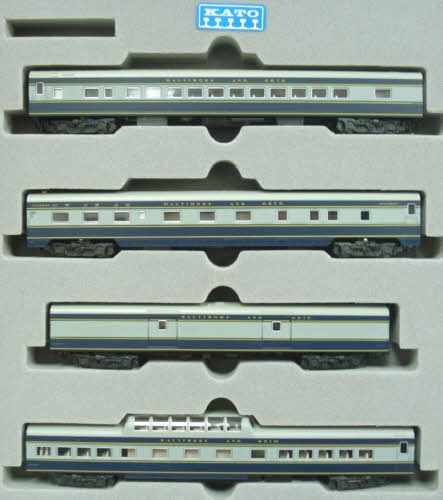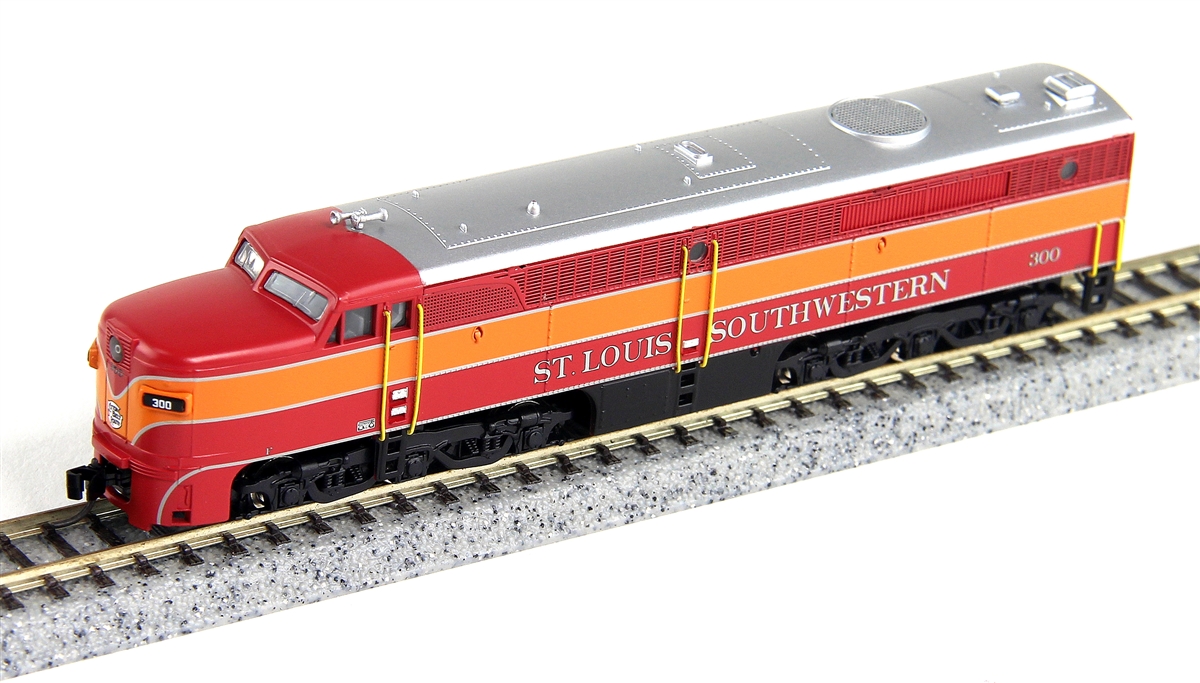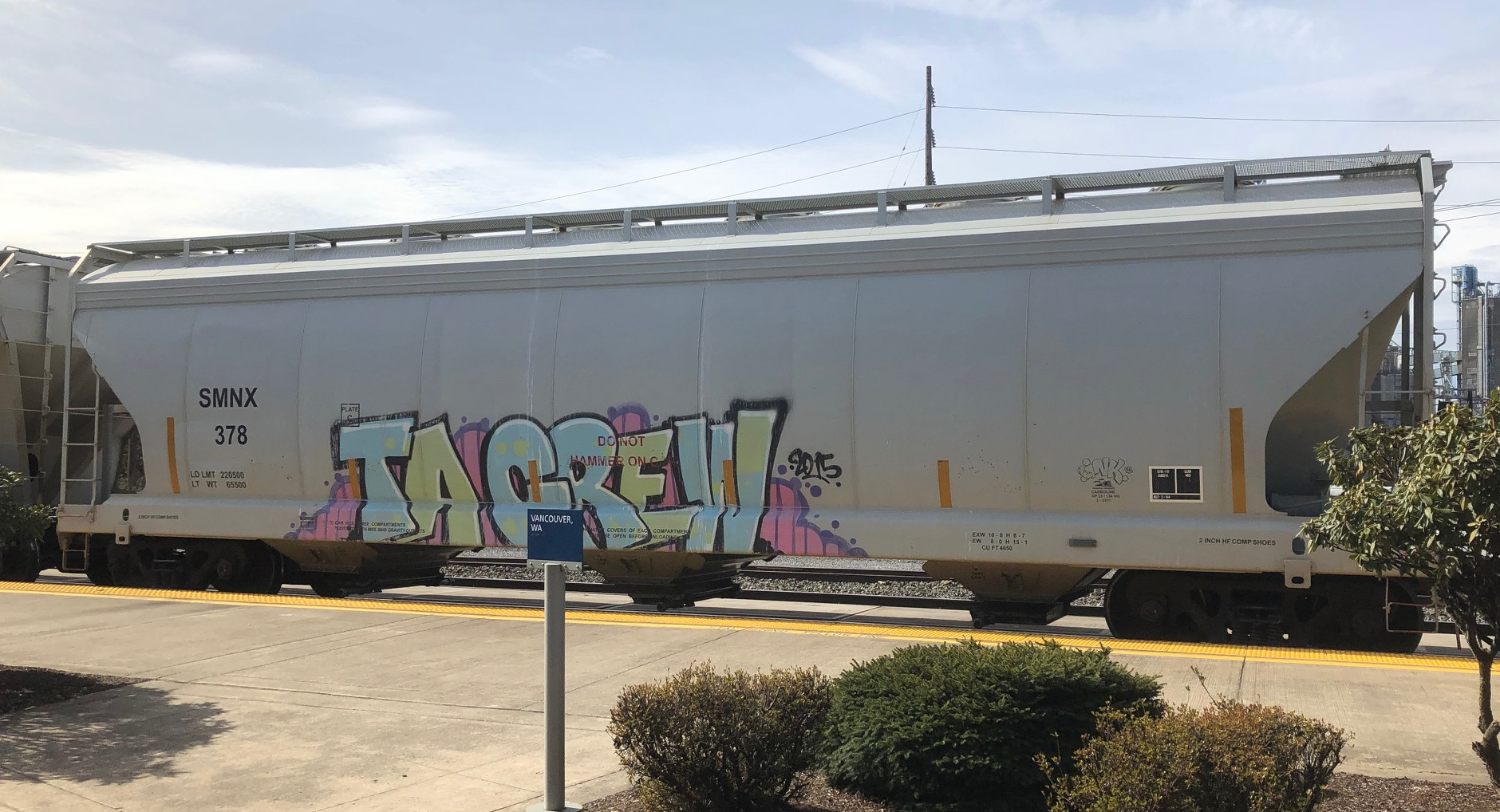Specific Item Information: This 3-bay covered hopper with elongated hatches is tan with orange logo and runs on Barber Roller Bearing trucks. Lettered for the Grainbelt Corporation, a wholly-owned affiliate of Farmrail Systems, Inc. Formed in the early 1980s, today Farmrail operates over 100 miles of track over ex-BN and SF feeder lines, mainly in Oklahoma, and has connections with BNSF and Union Pacific.
Prototype History: Production of the 4650-cubic foot 3-bay cars began in 1964. ACF built 2504 examples at Huntington, WV, between 1964 and 1972. The ACF 4650 c.f. 3-bay hopper was the same height and width as the 5250 c.f. 4-bay car but several feet shorter in length (and only had 3 bays!). Some railroads that were not concerned about having the larger plate C clearance 4650cf cars (which could not be used on all branchlines or at all loading facilities) opted for large fleets of 4650cf cars instead of 4600cf. UP and SP were two such railroads (all of the current UP 4600cf cars came from either MP or C&NW heritage).
Hatches: 6 30", 6 20", 3 pressed steel elongated (SP, SSW, 3 piece pressed steel continuous or 4 piece FRP continuous. Outlets: Several types of bolted or welded on outlets are used. Uses: Grain, soda ash, platic pellets. Trucks: 77 ton friction or roller bearing. 86 had 100 ton roller bearing.
Hatches: 6 30", 6 20", 3 pressed steel elongated (SP, SSW, 3 piece pressed steel continuous or 4 piece FRP continuous. Outlets: Several types of bolted or welded on outlets are used. Uses: Grain, soda ash, platic pellets. Trucks: 77 ton friction or roller bearing. 86 had 100 ton roller bearing.
Road Name History:  Farmrail is one of several lines to be born from the 1980 shutdown of Rock Island. Beginning operations in 1981, Farmrail has a “t” shaped system running from Erick to Weatherford on one axis and Westhorn to Elmer on the other with the junction in Clinton, all in western Oklahoma. The total mileage is 186 (putting it between Columbus & Greenville and Bessemer & Lake Erie in relative size.) The Erick to Weatherford line is owned by the Oklahoma DOT with Farmrail being the designated operator.
Farmrail is one of several lines to be born from the 1980 shutdown of Rock Island. Beginning operations in 1981, Farmrail has a “t” shaped system running from Erick to Weatherford on one axis and Westhorn to Elmer on the other with the junction in Clinton, all in western Oklahoma. The total mileage is 186 (putting it between Columbus & Greenville and Bessemer & Lake Erie in relative size.) The Erick to Weatherford line is owned by the Oklahoma DOT with Farmrail being the designated operator.
They run the line with one SW7, one GP7, four GP9’s, and eight GP10’s. All geeps have had their short hoods lowered and carry a paint scheme that would be right at home on a carton of eggs. Nearly all of the units are named after Native-American tribes. Farmrail’s sister railroad Grainbelt runs parallel to the Westhorn – Elmer line but to the east. In recent years, Farmrail and Grainbelt have been picking up used GP38’s (in a couple of varieties) to help with heavier trains. Traffic supporting the oil business has either been substantial or absent – depending on the market price for crude at any given time.

They run the line with one SW7, one GP7, four GP9’s, and eight GP10’s. All geeps have had their short hoods lowered and carry a paint scheme that would be right at home on a carton of eggs. Nearly all of the units are named after Native-American tribes. Farmrail’s sister railroad Grainbelt runs parallel to the Westhorn – Elmer line but to the east. In recent years, Farmrail and Grainbelt have been picking up used GP38’s (in a couple of varieties) to help with heavier trains. Traffic supporting the oil business has either been substantial or absent – depending on the market price for crude at any given time.
Brand/Importer Information: Micro-Trains is the brand name used by both Kadee Quality Products and Micro-Trains Line. For a history of the relationship between the brand and the two companies, please consult our Micro-Trains Collector's Guide.
Manufacturer Information:  Micro-Trains Line split off from Kadee Quality Products in 1990. Kadee Quality Products originally got involved in N-Scale by producing a scaled-down version of their successful HO Magne-Matic knuckle coupler system. This coupler was superior to the ubiquitous 'Rapido' style coupler due to two primary factors: superior realistic appearance and the ability to automatically uncouple when stopped over a magnet embedded in a section of track. The success of these couplers in N-Scale quickly translated to the production of trucks, wheels and in 1972 a release of ready-to-run box cars.
Micro-Trains Line split off from Kadee Quality Products in 1990. Kadee Quality Products originally got involved in N-Scale by producing a scaled-down version of their successful HO Magne-Matic knuckle coupler system. This coupler was superior to the ubiquitous 'Rapido' style coupler due to two primary factors: superior realistic appearance and the ability to automatically uncouple when stopped over a magnet embedded in a section of track. The success of these couplers in N-Scale quickly translated to the production of trucks, wheels and in 1972 a release of ready-to-run box cars.
Micro-Trains Line Co. split off from Kadee in 1990 to form a completely independent company. For this reason, products from this company can appear with labels from both enterprises. Due to the nature of production idiosyncrasies and various random factors, the rolling stock from Micro-Trains can have all sorts of interesting variations in both their packaging as well as the products themselves. When acquiring an MTL product it is very important to understand these important production variations that can greatly enhance (or decrease) the value of your purchase.
Please consult our Micro-Trains Collector's Guide

Micro-Trains Line Co. split off from Kadee in 1990 to form a completely independent company. For this reason, products from this company can appear with labels from both enterprises. Due to the nature of production idiosyncrasies and various random factors, the rolling stock from Micro-Trains can have all sorts of interesting variations in both their packaging as well as the products themselves. When acquiring an MTL product it is very important to understand these important production variations that can greatly enhance (or decrease) the value of your purchase.
Please consult our Micro-Trains Collector's Guide
Item created by: CMK on 2022-01-04 20:23:10. Last edited by grothe77 on 2022-02-05 22:17:29
If you see errors or missing data in this entry, please feel free to log in and edit it. Anyone with a Gmail account can log in instantly.
If you see errors or missing data in this entry, please feel free to log in and edit it. Anyone with a Gmail account can log in instantly.


